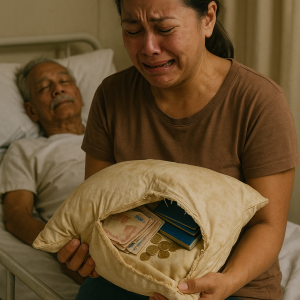
It was a warm afternoon in Chicago when seventeen-year-old Alyssa Carter walked into the tall glass doors of Northwell Bank, holding her very first paycheck. The paper felt heavier than it should have — it wasn’t just money, it was proof that she had done something on her own. After weeks working as an intern at a digital-design firm, she was proud of the $420 she’d earned.
She stood in line, wearing her denim jacket and sneakers, rehearsing her words: “I’d like to deposit this, please.” Simple enough. When it was her turn, she smiled at the teller, a woman with polite eyes who looked at the check, hesitated, and said she needed to get her manager.
Alyssa’s stomach tightened. The teller walked away, and within seconds a man appeared — Mr. Greer, the branch manager. His expression was all business, his voice clipped. “Miss, may I see your ID?”
Alyssa handed it over without thinking. Mr. Greer studied it, then the check, then her again. “Where did this come from?” he asked.
“From my job,” she said carefully. “At NovaPoint Creative.”
He raised a brow. “That’s a corporate design firm downtown. You’re saying you work there?”
“Yes, sir. I was an intern this summer.”
He didn’t respond. Instead, he nodded to a security guard near the door. “Stay right here,” he said, taking the check and disappearing into his office. Through the glass wall, Alyssa saw him pick up the phone, speaking rapidly. Then, her heart sank — two police officers were walking toward her.
“Miss, can we talk to you?” one officer said. “We’ve had a report about a possible forged check.”
Alyssa froze. “Forged? No, it’s real! I— I can show you my employee badge!”
But no one seemed to be listening. The lobby had gone quiet. A man waiting in line whispered something to his wife. Another customer pulled out a phone, filming.
Her hands trembled as she sent a quick text: Mom, they called the police on me at the bank.
Ten endless minutes passed. Then the sound of heels clicking across the marble floor broke the silence. A tall woman in a charcoal gray suit walked straight through the doors — poised, confident, eyes burning with calm fury.
“I’m Dr. Lillian Carter,” she said, stopping in front of the officers. “President and founder of NovaPoint Creative. And that young woman you’re questioning is my daughter.”
Every head turned. Mr. Greer stepped out of his office, looking suddenly pale. “You’re… you’re the president of NovaPoint?”
“That’s right,” Lillian said, pulling out her company badge and an envelope. “And this is a payroll check issued from my company’s account. The same account your bank services, I believe.”
The officers exchanged looks. One cleared his throat. “It seems there’s been some kind of misunderstanding.”
“A misunderstanding?” Lillian’s voice was calm, but sharp as glass. “You called the police on a teenager because she didn’t look like someone who could have earned that check. You didn’t verify it. You didn’t call our office. You jumped straight to suspicion.”

Mr. Greer stammered, “Ma’am, we handle a lot of fraud cases. We have to be cautious—”
“Cautious is calling the company before humiliating a child,” she interrupted. “Cautious is training your staff to recognize bias before it hurts someone.”
People in the lobby were recording now, whispering. The officers quietly apologized to Alyssa and walked out. The room was still except for the hum of the air conditioning.
Lillian placed a steady hand on her daughter’s shoulder. “Are you all right, sweetheart?”
Alyssa nodded, though her eyes stung. “I didn’t do anything wrong.”
“I know,” her mother said softly. Then she looked back at the manager. “Mr. Greer, this isn’t just about my daughter. It’s about every young person who walks into a bank and gets treated like a suspect for daring to believe they belong.”
He swallowed hard. “Ms. Carter, I truly regret this. I assure you it wasn’t personal.”
“It never is,” she said. “That’s what makes it so dangerous.”
As they walked out, the tension in the room followed them like a shadow. Outside, the city lights flickered on, and the evening breeze carried away the sting of what had just happened. Alyssa felt both humiliated and strangely proud. Her mother hadn’t raised her voice. She hadn’t needed to.
At dinner that night, Alyssa asked quietly, “Mom… does this kind of thing happen to you too?”
Lillian looked down at her glass for a moment before answering. “More often than you’d think. People see what they expect to see. But every time we stand tall, every time we refuse to shrink, we teach them to expect better.”
A few days later, the story hit the news. Someone’s phone video had gone viral on social media, captioned: Bank calls cops on teen — CEO mom walks in. Comments poured in from around the country.
“This is why representation matters.”
“That woman handled it with grace and fire.”
“Imagine realizing the girl you profiled is the boss’s daughter.”
Within a week, Northwell Bank issued a public apology and announced a mandatory inclusion training for all staff. Meanwhile, NovaPoint launched the Alyssa Fellowship, a program supporting high school students of color pursuing careers in design and entrepreneurship.
When Alyssa saw the press release, she smiled. “You turned something awful into something good,” she said.
Her mother smiled back. “That’s how change begins — not with anger, but with courage.”
And for the first time since that day, Alyssa felt proud not just of her paycheck, but of the lesson her mother had taught her: sometimes the most powerful statement you can make is simply standing in the truth of who you are.



